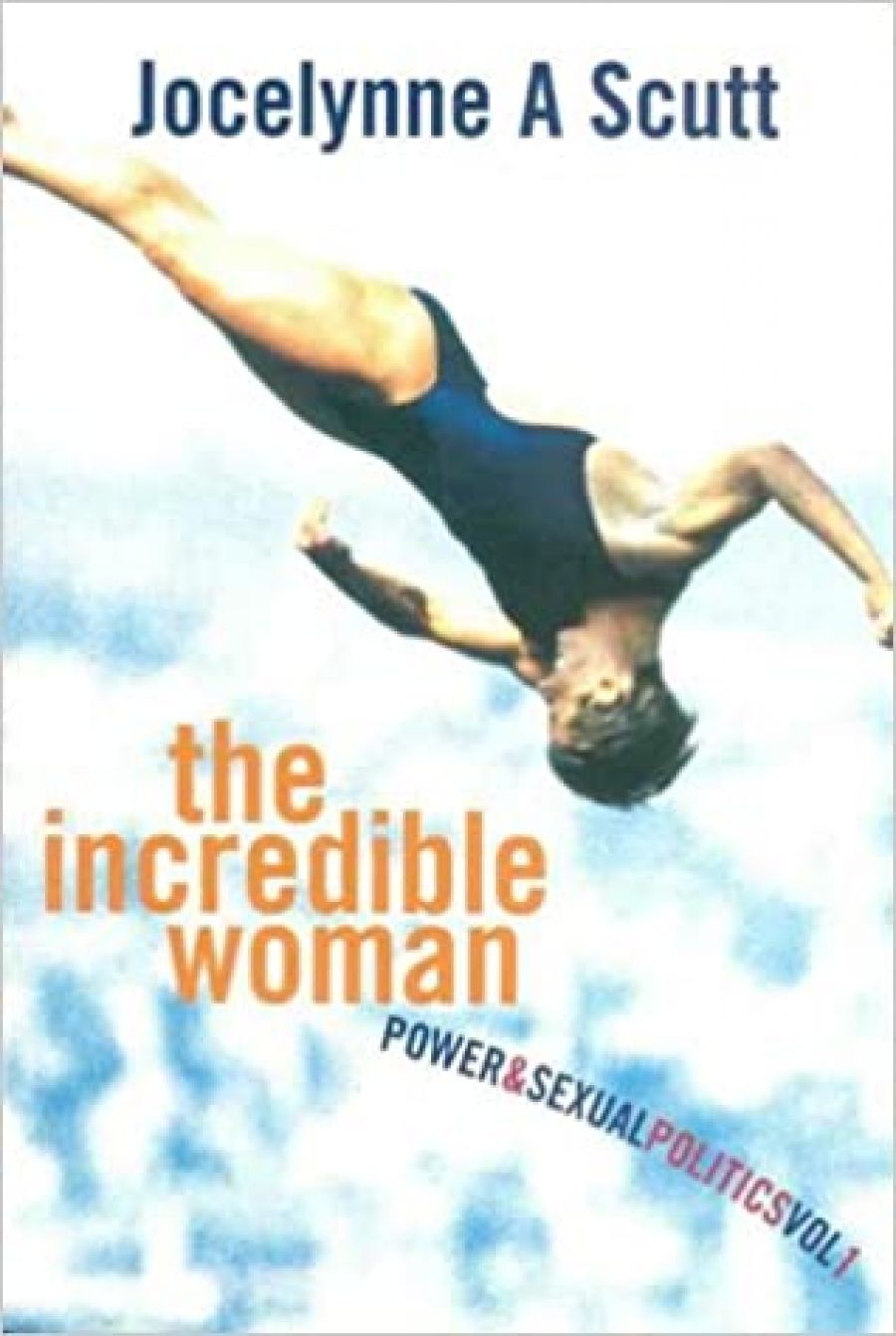
- Free Article: No
- Contents Category: Gender
- Review Article: Yes
- Article Title: Sexual Politics
- Online Only: No
- Custom Highlight Text:
When I mentioned to one of my exceptionally brainy friends that I was reviewing Jocelynne Scutt’s recent collection of speeches and papers – most of which were written during the late 1980s and 1990s and which have now been edited for a two volume work entitled The Incredible Woman – I was, strange as it may seem, not surprised to hear her say that the very thought of reading anything by Scutt made her anxious. For while those of us who are familiar with Scutt’s work will be aware of how wonderfully accessible it is, those who are familiar instead with Scutt’s formidable reputation might well presume that her writing will be heavygoing. It’s not. And because Incredible is both accessible and an important contribution to feminist politics, it would be a pity if people shied away from it.
- Book 1 Title: The Incredible Woman
- Book 1 Subtitle: Power and sexual politics (Vol. 1)
- Book 1 Biblio: Artemis, $34.95 hb, 336 pp
- Book 2 Title: The Incredible Woman
- Book 2 Subtitle: Power and sexual politics (Vol. 2)
- Book 2 Biblio: Artemis, $34.95 hb, 345 pp
- Book 2 Cover Small (400 x 600):

- Book 2 Cover (800 x 1200):

- Book 2 Cover Path (no longer required): images/ABR_Digitising_2021/Archives_and_Online_Exclusives/scutt incredible woman vol 2.jpg
While the scope of this text is wide-ranging, the papers are linked by the way they relate to Scutt’s general contention that in a masculinist society like ours, women are mostly perceived as ‘incredible’ subjects – particularly in the fields of law, medicine, business and politics, which are dominated by both the presence of men and the discourses of patriarchy. For Scutt, an incredible woman is one whose words are neither trusted nor taken seriously. Moreover, both the life and work of an incredible woman are regarded as being ‘naturally’ less important than the work and the lives of men. As someone who is critical of ‘the incredible woman syndrome’, Scutt aims to draw attention to the ways in which women are represented as incredible in particular socio-political contexts, and subsequently underscore and undermine the ‘logic’ that underpins those representations.
The issues Scutt addresses include the ways in which the ‘judicial mind’ regularly represents female rape victims as incredible subjects (particularly if they’re prostitutes), how women’s paid and unpaid work is often not afforded the same value as the work of men and how the medical fraternity impinges on the rights of women to choose whether to keep or, conversely, abort a foetus. Scutt also looks at the degree to which women’s concerns about gun control are taken seriously, at whether or not pornography instantiates a form of free speech (with particular emphasis on American Psycho), and even at how the term ‘Aboriginality’ is often defined by non-indigenous Australians in masculinist terms.
Incredible is an important work insofar as its materialist emphasis makes visible the embodied existence of mainly heterosexual women, and highlights the ways in which those existences have been, and continue to be, largely framed by masculinist assumptions and patriarchal agendas which must be questioned if women are going to accrue the right to self-determination.
There were a few times, though, when I would have liked to see Scutt pick up and analyse some of the issues which slink into the folds of this text (the footnotes, the parentheses, the instances of indirect speech) precisely because such analysis would have expanded Scutt’s occasionally limiting assumptions about what a ‘woman’ is and what that woman’s relation to other ‘women’ might be. Certainly, Scutt acknowledges that the experiences of an Anglo–Celtic woman are not necessarily commensurate with those of, say, an Indigenous Australian woman. But her intimations of the shared values of women are problematic insofar as they obfuscate how power differentials exist not just between men and women but also between women and women. (Focusing on the brief reference she makes to the exploitation of an IVF patient by her female doctor, for example, would have provided Scutt with a means of engaging with the issue of same-sex power relations and the degree to which those relations may be inflected by the discourse of patriarchy.) Similarly, I would have liked to see Scutt unpack her usage of the word ‘woman’. And I say this not only because I’m intrigued by the fact that while Scutt refers to Janice Raymond’s The Transsexual Empire, she does not examine the kinds of issues it might raise for her critique of ‘incredible women’, but also because my own interest in the work of queer and feminist theorists like Judith Butler and Eve Kosofsky Sedgwick has prompted me to think about how the identificatory category of ‘woman’ is not necessarily determined by the anatomy with which one is born.
Indeed, by the time I’d finished Incredible I was still wondering whether a more flexible understanding of what a woman is might possibly complement Scutt’s general argument that ‘women’ (irrespective, I would argue, of whether or not their gender assignment is female) are coded as ‘incredible’ within a patriarchal community. One thing’s for certain, though: Incredible certainly offers a lot of food for thought.


Comments powered by CComment